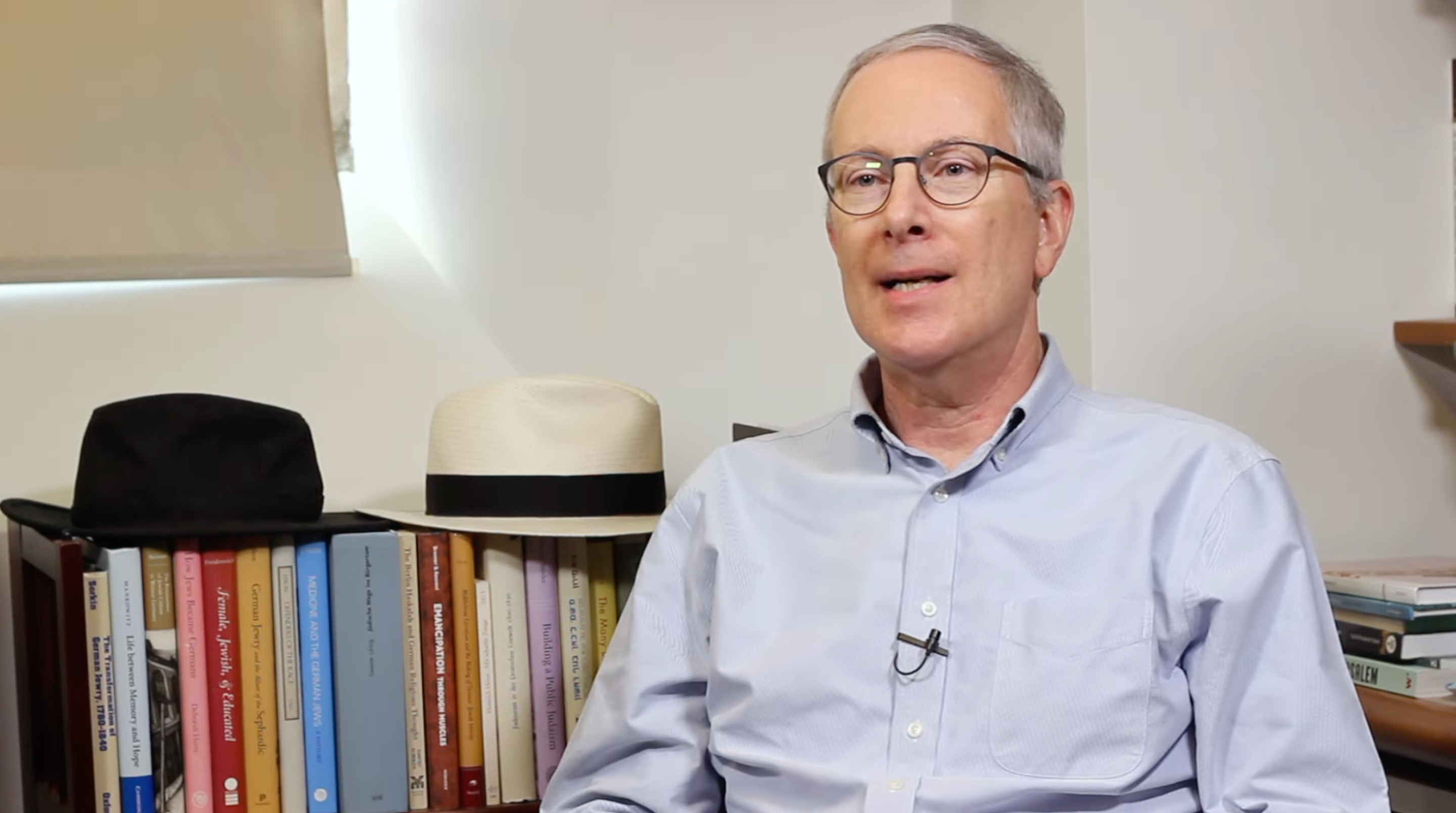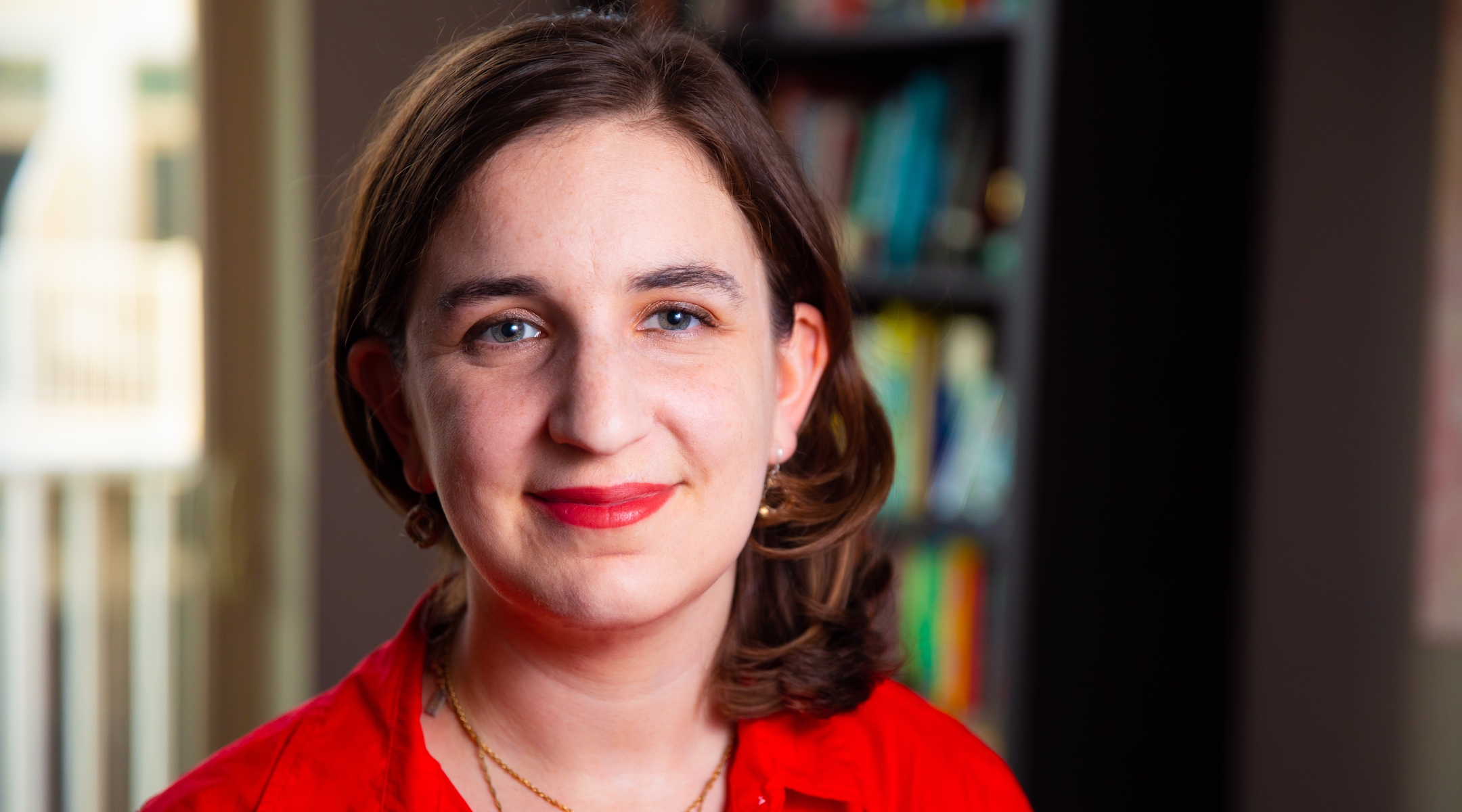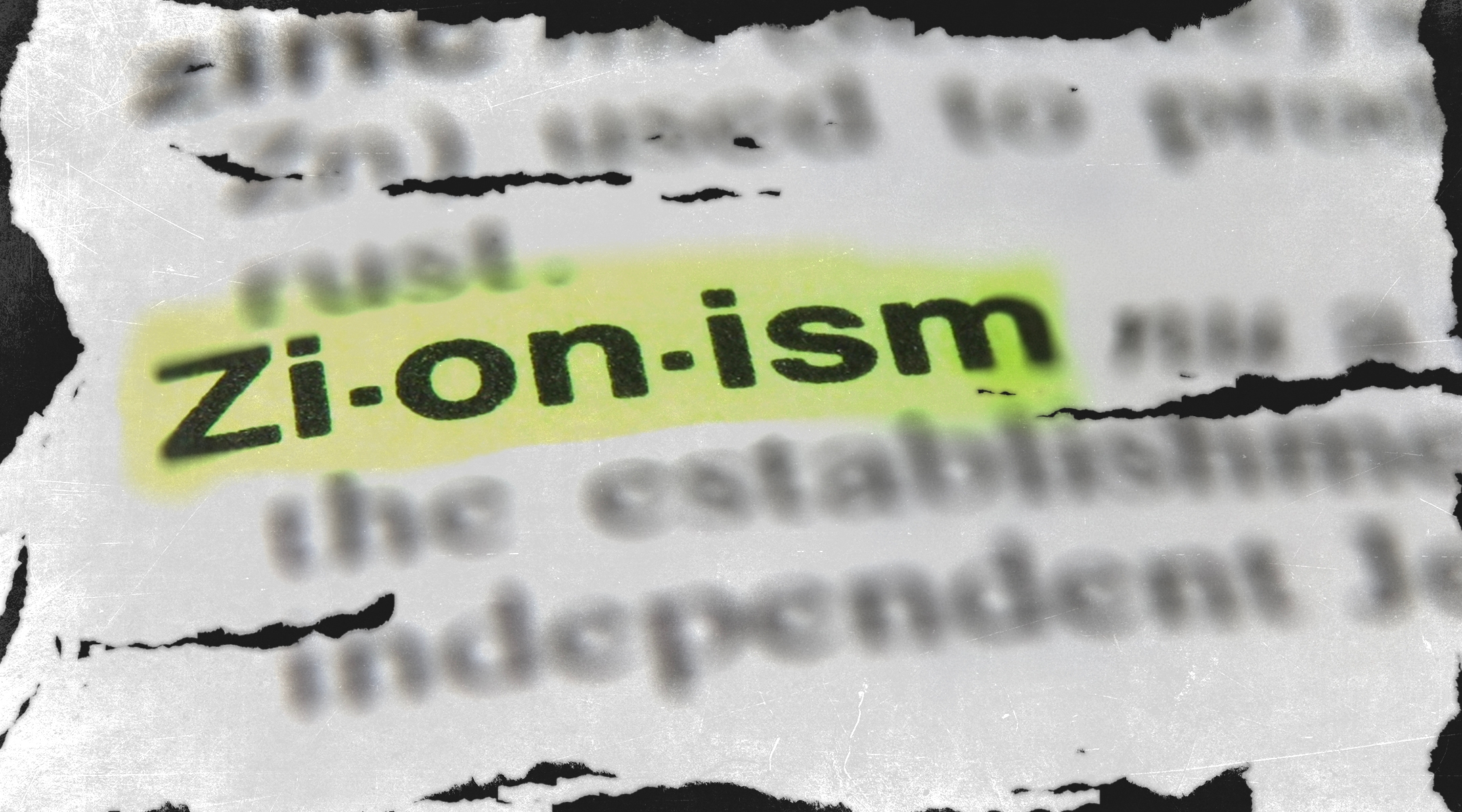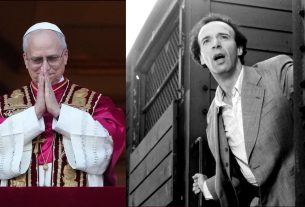This article is part of a project examining how Oct. 7 and its aftermath have changed the Jewish world. You can see the complete project here.
((JR)) — Dictionaries are remarkably consistent when it comes to the definition of “Zionism”: Merriam-Webster, for example, defines the term as “an international movement originally for the establishment of a Jewish national or religious community in Palestine and later for the support of modern Israel.”
And yet few words have been as scrutinized, debated, embraced and demonized in the year since Hamas’ Oct. 7 attack on Israel, which killed 1,200 and led to a war in Gaza that has killed more than 40,000. Google’s search data shows interest in “Zionism” was more than twice as high in October and November 2023 than at any other time in internet history. The most frequent searches were for definitions.
The ideology has never been contained to just one meaning, with non-statist Zionists, political Zionists, labor Zionists, cultural Zionists, post-Zionists, revisionist Zionists and religious Zionists all advancing different visions of Jewish self-determination over time. The founding of a Jewish state fragmented perceptions of Zionism between the hopes, ideals and identities of those who use the term and the political realities of Israel. But over the last year, its definition has become harder than ever to pin down.
Opponents of Zionism, who mobilized around the war and also include a subset of left-wing Jews, say it is an ideology of colonialism and apartheid, at best a way for one ethnic group to dominate another and at worst a recipe for genocide. Some have set “no Zionists” rules at pro-Palestinian protests.
Pro-Israel Jewish groups have called the new wave of anti-Zionism antisemitic and say that asking Jews to reject “Zionism” is asking them to negate a core aspect of their identity and disregard their affinity for a country where half of their co-religionists live.
The fighting has been so pitched that social media companies and American universities have considered whether to police the use of the word “Zionist” — a term that has long been a badge of pride for many Diaspora Jews but has become a pejorative in many contexts.
We asked eight authors, advocates and scholars of Jewish history and the Middle East what “Zionism” means to them, how its definition changed with the founding of Israel, and what new meanings it has taken on since Oct. 7. Here’s what they said.
- Liz P.G. Hirsch is a rabbi and CEO of Women of Reform Judaism, the women’s affiliate to the largest Jewish denomination in North America.
- Sara Hirschhorn is a visiting professor at the University of Haifa Ruderman Program for American Jewish Studies. She is the author of “City on a Hilltop: American Jews and the Israeli Settler Movement.”
- Amal Jamal is a Palestinian Druze professor of political science at Tel Aviv University and head of the Walter Lebach Institute for the Study of Jewish-Arab Coexistence.
- Shaul Magid is the distinguished fellow in Jewish Studies at Dartmouth College and the rabbi of the Fire Island Synagogue.
- Derek Penslar is a professor of Jewish history and the director of Harvard University’s Center for Jewish Studies. He is the author of “Zionism: An Emotional State.”
- Adi Ophir is an Israeli philosopher and a visiting professor of humanities and Middle East studies at Brown University. He is the co-author of “The One-State Condition: Occupation and Democracy in Israel/Palestine.” He served in the IDF during the 1973 Yom Kippur War.
- Emily Tamkin writes about American Jewish identity. She is the author of “Bad Jews: A History of American Jewish Politics and Identities.”
- Gil Troy is a professor of history at McGill University and a Zionist activist living in Jerusalem. He is the author of “Why I Am a Zionist: Israel, Jewish Identity and the Challenges of Today.”
(JR): What does Zionism mean in your life?
DEREK PENSLAR: I see Zionism as a revolutionary movement aspiring to create a strong and stable democratic state rooted in Hebrew culture. To be a Zionist is to be part of that project and not to hold back from criticism when it falls short of its promise.
ADI OPHIR: Zionism has been a mental and emotional straitjacket from which I have been struggling to release myself since October 1973.
GIL TROY: Zionism is the defining ideological framework of my life, rooting me in the Jewish story, connecting me to my people, the Jewish people, and inspiring me to fulfill my dreams and our dreams, while making the world a better place.
EMILY TAMKIN: Professionally and personally, it’s the thing people with whom I speak and spend my time are grappling with or are divided by.
AMAL JAMAL: I work at Tel Aviv University. I live here with many friends from the Jewish community. And I differentiate between being Jewish and being Zionist, although many of my friends are Zionists. For most of them, Zionism is about Israel as a safe haven for Jews, which I agree with.
Amal Jamal is a Palestinian Druze professor of political science at Tel Aviv University and head of the Walter Lebach Institute for the Study of Jewish-Arab Coexistence. (Screenshot)
But I always tell them, it’s for you to prove that Zionism can go together with equality. It’s not for me to prove that. If you are a Zionist and I am the “other,” you have to prove every day that you treat me equally, you respect my identity, my right to culture and national aspirations as much as they are legitimate for you. Because so far, Israel has not managed to prove that it can be Jewish and democratic in a fair way. For me, so far, Zionism on a daily basis entails discrimination, inequality, marginalization.
LIZ P.G. HIRSCH: For me, Zionism is directly connected to Jewish peoplehood. We can understand our relationship to the Jewish people as inherently part of the same covenant that we have with God. What’s more, we join this covenant together — not as individuals, and not only collectively with the people we like or agree with. This extends to those of differing opinions in North America, and it extends to Jewish people around the world, including those in Israel.
SHAUL MAGID: I did not grow up a Zionist, but it became central to my life as a young Jewish adult when I made aliyah to Israel in 1980 and became a citizen. I became disillusioned with Zionism while serving in the IDF during the First Intifada, and seeing up close the way in which we were dominating the Palestinian people. Last year, in my book “The Necessity of Exile,” I proposed the idea of “counter Zionism,” which argues that while Zionism may have been a necessary ideology to found a state, it can no longer function to create an equitable society in that state. We need a new political ideology where Jews and non-Jews can live as equal citizens in the land.
SARA HIRSCHHORN: Zionism is my aspiration and expression of national liberation as an individual and collective, to be part of the radical experiment of Jewish sovereignty, and to hopefully see a secure future for the Jewish people on this planet.
How did the founding of Israel change Zionism?
TAMKIN: This is the most important question, I think. It’s one thing to believe in or argue for the right of something to exist when it does not yet exist. But once it does exist, as Israel does and has for decades, the word becomes used to describe both the “home” as people believe it should exist and the state as which it actually does.
I know many people, Jewish and not, for whom Zionism means belief in the right to self-determination for Jews and Palestinians; I also know many people, Jewish and not, for whom it means the reality of the establishment of a state that has seen the dispossession and displacement of Palestinians. And there are, of course, people for whom the idea and the current reality of Israel mean the same thing.
PENSLAR: Until the Second World War, it was possible to be a Zionist without explicitly endorsing sovereign Jewish statehood. After the Holocaust and the creation of the state of Israel, Zionism became synonymous with support for the state, especially in its conflict with the Arab world.

Derek Penslar is a professor of Jewish history and the director of Harvard University’s Center for Jewish Studies. He is the author of “Zionism: An Emotional State.” (Screenshot)
HIRSCH: The founding of the modern state of Israel was the manifestation of what thought leaders and dreamers intended. A Jewish homeland for the Jewish people was finally established.
MAGID: In some way, the founding of the state could have ended Zionism. Ben-Gurion [the first prime minister of Israel] suggested that. If Zionism was a revolutionary movement to found a Jewish state, 1948 could have been its conclusion.
Instead, Zionism became a kind of “permanent revolution” and a political ideology of Jewish privilege in a democracy. The “Jewish and democratic state” addition to Israel’s Basic Law in 1985 attempted to argue that Jewish majoritarianism was not in contradiction to democracy, but that theory has proven to be more problematic in the past few decades.
TROY: Movements are often threatened by success. In this case, because it was always proactive not just reactive, dreaming, idea-driven, Zionism continued to be volcanic, catalytic, hoping to make Israel ideal and the world better — even as Zionism was forced to adjust and deal with the ongoing, genocidal hostility of too many of Israel’s neighbors.
OPHIR: The establishment of the state killed the option of non-statist Zionism and implanted both the colonial and the national aspects of Zionism in powerful state apparatuses.
HIRSCHHORN: The founding of the state of Israel changed Zionism from a theory or an idea to the reality of governing a state of the Jews, from many different origins, backgrounds and traditions, and also a sizeable minority of non-Jews who found themselves living in a Zionist state after 1948.
JAMAL: When you translate any idea from a utopian ideal into reality, it becomes distorted. Reality cannot contain ideals as they are imagined. Of course, the moment Zionist Jews landed in the country, they became aware of the fact that this land is full of people who belong to another culture, who consider it to be their homeland.
How did Oct. 7 change Zionism?
HIRSCH: Oct. 7 changed everything for the Jewish people, therefore it changed Zionism. After Oct. 7, being a proud Zionist means I believe women when they said they were brutally attacked and raped. Being a Zionist means I believe in Israel’s right to defend itself against the attacks from Hamas and Iran’s proxies. Being a Zionist means that I support and care for all of Israel’s citizens, and all people, regardless of religion. At a recent havdalah service in Tel Aviv, I sang the Israeli song “Ein Li Eretz Acheret” — “I Have No Other Country.” As an American, as a Jew, that song is still true for me.
PENSLAR: There has always been a tension within Zionism, between its promise of safety and security for persecuted Jews anywhere and the insecurity with which Israel has had to contend since it was established. Oct. 7 made that tension much more difficult to bear. The Oct. 7 massacre and Israel’s response also amplified anti-Zionist speech and acts, leaving Jews throughout the world feeling vulnerable and anxious.
TROY: Some claim Zionism failed on Oct. 7. I don’t. Zionism never promised us a rose garden or a state on “Magash Hakesef” [a silver platter]. On Oct. 7 the government failed, the IDF failed — but Zionism succeeded, mobilizing Israelis, having given Israelis the tools to defend themselves so that Israelis could save Israel.
MAGID: In some way, it has made the Jewish privilege of older Zionism into an ideology of Jewish domination as an arguably necessary policy to ensure Jewish security.
The more humanistic inclinations of some Zionists to resolve the age-old “Arab Question” — how do Arabs become integrated in the Jewish state? — through political compromise, is giving way to a position that would deny Palestinians self-determination by seeing them as a perennial threat to Jewish sovereignty in the land.
Oct. 7 may be viewed as the death of liberal Zionism, and the fracturing of American Zionists into more reactionary forms of Zionism or abandoning Zionism for alternative ways of Jewish identity.
HIRSCHHORN: I don’t think it changed Zionism at all. Zionism has been about the right to exist, self-determination, national liberation and the ability to find a place of Jewish safety all along. If anything, it only brought the existential element of the Israeli-Palestinian conflict — or the dilemmas of 1948 which have never disappeared — into sharper focus.
JAMAL: For Jews, there is the concern for safety, self-determination, the right of a historical connection between Jewish identity as it developed 2,000 years ago and today’s Israeli Jewish identity and culture.
The issue is that we have to look at Zionism as a political ideology, as something that cannot be disconnected from practical reality and practical ethics. When you look at the polls in Israel, asking to what extent Israel has to take into consideration the civilian population in Gaza when fighting Hamas, you see a great majority of Israelis say it shouldn’t — that the Israeli army shouldn’t be sensitive to the basic civic safety of non-combatants. That means Israel has changed as a result of Oct. 7.

Emily Tamkin is the author of “The Influence of Soros” and “Bad Jews: A History of American Jewish Politics and Identities.” (Courtesy Tamkin)
OPHIR: Oct. 7 certainly exposed the genocidal potential of the settler-colonial project, and Zionism’s impressive flexibility to tolerate genocidal culture and policies. These were much older than the Hamas attack, which provided a new impetus and self-justification for the perpetrators.
TAMKIN: I don’t think it changed it, but I do think that it brought different understandings [of Zionism] — and different realities — further into the open.
How do you understand anti-Zionism?
JAMAL: Just as Zionism means different things for different people, it’s the same thing with anti-Zionism. When you say anti-Zionism, it could be non-Zionism, meaning: “I’m not Zionist, but I know that some people are Zionist and I respect the right to be Zionist.” This is one end of the spectrum. On the other side of the spectrum, you have anti-Zionism that means abolishing Zionism, because Zionism is conceived to be racism and therefore is fundamentally illegitimate.
HIRSCHHORN: Anti-Zionism is a phenomenon as old as Zionism itself — first as an internal Jewish objection from the ultra-Orthodox and also from the internationalist Left, then as a local Palestinian opposition to the immigration and settlement of Ottoman and British Palestine before 1948, and then as an Arab and global movement.
PENSLAR: Broadly understood, anti-Zionism sees the creation of the Jewish state as a crime, or at least a tragedy, and seeks to replace Israel’s regime with a binational democracy or to deny Jewish rights in Palestine altogether.
TROY: Anti-Zionism today festers in the unhappy intersection of traditional Jew-hatred and a modern illiberal, anti-Western mania. If once upon a time in Medieval Europe, in Islamic lands, the Jew was broadly hated, today, the human rights activist Irwin Cotler notes, Israel is the Jew of the world.
HIRSCH: Before, the line between anti-Zionism and antisemitism was more clear. But since the start of the war, many attacks toward Israel have involved antisemitic tropes, not holding the government accountable, but rather harming Jews, many in North America.
TAMKIN: Opposition to the idea of Israel as a Jewish state, or a state exclusively or primarily for Jews.
OPHIR: A struggle which, at least since the collapse of the Oslo peace process, has become a moral duty, as it is more than ever today.
MAGID: There is a long-standing Jewish tradition that opposes Zionism for a variety of reasons.
One is on theological grounds that the Jews are destined to remain in exile until the end-time and quickening that end, which Zionism arguably does, is prohibitive. There is “dual-allegiance” anti-Zionism that claims Zionism presents Jews with pledging fidelity to two distinct sovereign states. There is “Judaism as a religion” anti-Zionism that claims Jews are not a nation but carriers of a religion, and thus do not aspire to return to the land but consider the land where they live as their home.
There is Jewish socialist or communist anti-Zionism, which views the destiny of the Jew to fight against injustice and oppression wherever they reside. Then there is cosmopolitan anti-Zionism that argues Jews are best served by living with others and expressing their Jewishness, however they do so, in a cosmopolitan context. There is also a kind of non-nationalist anti-Zionism that views nationalism as a corrupt, corrosive and violent collective ideology that Jews should avoid, retaining their special relationship with God.
I think many young Jews today embrace an anti-Zionism that is really opposed to Zionist hegemony. They want to be able to cultivate their Jewish identity outside any affiliation with a state that claims to represent them but one which they cannot, or do not want to, support.
What is the future of Zionism?
HIRSCHHORN: The future of Zionism is bright — if only because Jewish history has taught us that being (only) a Diasporic people has fatal consequences and Zionism must be part of the Jewish future.
TAMKIN: I don’t know. For American Jews specifically, I don’t think it will get back the kind of consensus support it enjoyed for much of the 20th century — though, as books like “The Threshold of Dissent” and “Our Palestine Question” remind us, there have always been American Jews who did not sign onto that consensus. I also don’t think that means it’s over.
JAMAL: As you know, “prophecy has been given to fools.” Given that it’s not one thing, it’s hard to say how it could develop.
I hope that the moderate and humanistic version of Zionism will win. I’m not determinist in the way I see human destiny, so I hope that Israelis will learn — albeit in the hard way — that racist versions of Zionism are not sustainable. For Zionism to remain something that expresses the right of self-determination for Jews, it has to compromise. It has to adopt the most moderate version of this right. So far, the historical trend in which we live is not that way. But history is an open horizon that could change in the future.
TROY: I believe this is our generation’s ’67 moment. Just as [the 1967 Arab-Israeli War] clarified how deep the Jewish tie is to Israel, Oct. 7 confirmed all kinds of Zionist lessons — that we Jews share a common fate, that we are intertwined, that we will protect ourselves because we have no choice, that we will rebuild better, and that while we have enemies, we will not let our enemies define us.
HIRSCH: The future of Zionism is to understand that we are in a collective covenant with the Jewish people around the world. Jews deserve to live in safety, just like any other people, ethnicity or religion. We must continue to fight for these ideals with the collective Jewish people, even those we may disagree with, to sanctify and ensure this homeland for generations to come.
PENSLAR: The most dynamic form of Zionism today is religious Zionism. Its striving to provide Jews a richer, more meaningful spiritual and communal life in the Land of Israel is praiseworthy. But it has become increasingly linked with the dismantling of Israeli democracy and the denial of rights, security, or life itself to Palestinians in Gaza and the West Bank.
Jews repelled by these trends may be tempted to walk away from Israel altogether. But the only way forward is to engage with Israel through a Zionism that is critical yet committed.
MAGID: I think Zionism will become less liberal and more hyper-nationalist. I think liberal Zionism will become diminished, in part because it no longer embodies the values of the state as such. I think Zionist hegemony will weaken as more Jews cultivate their Jewish identities outside Zionism — some opposed to it, some not.
I think opposition to Zionism is emergent and this is healthy — for the Jews and for Zionism. In the future, Zionism may take its rightful place among a variety of Jewish political ideologies that Jews can choose from to curate their Jewish identities. In short, I think the Zionist “revolution” is coming to an end while Zionism will continue.
OPHIR: I would rather leave this question to the prophets.
Support the Jewish Telegraphic Agency
Help ensure Jewish news remains accessible to all. Your donation to the Jewish Telegraphic Agency powers the trusted journalism that has connected Jewish communities worldwide for more than 100 years. With your help, (JR) can continue to deliver vital news and insights. Donate today.




